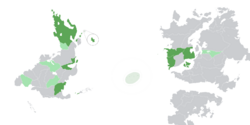Regional Organization of the Kivu Ocean
Regional Organization of the Kivu Ocean
| |
|---|---|
Motto: "Den Kivuischen Ozean schützen" | |
Anthem: Anthem of ROKO | |
 Member states shown in green. ROKO+5 members are in light green. | |
| Headquarters | Amking, Monsilva |
| Largest city | Gardena, Paleocacher |
| Working languages (in order of preference) | Kivuian・Cantuath・Monsilvan |
| Official languages of contracting states | |
| Membership | 11 (+5) states
|
| Leaders | |
• Secretary-General | Kong Yong-nian |
• Chairmanship | Kivu |
| Establishment | |
| 15 September 1992 | |
• Creation of ROKO Plus Five | 2 June 2009 |
| Population | |
• 2022 estimate | 557,241,752 782,870,953 (inc. Plus Five) |
| GDP (nominal) | estimate |
• Total | ₵30.13 trillion (inc. Plus Five) |
• Per capita | |
| HDI | very high |
| Time zone | TMB-06:00 to TMB+11:00 |
Regional Organization of the Kivu Ocean (Kivuian: Regionale Organisation des Kivuischen Ozeans, abbreviated ROKO) is a political and economic union of 16 member states on Ostlandet and West Ecros. It has a combined population of over 782 million and a combined nominal gross domestic product (GDP) of around ₵30 trillion, constituting approximately 40% of the global GDP (nominal).
ROKO was founded in September 1992 during the Trans-Kivu economic crisis which, although affecting many countries in the region, had more noticeable effects on the economies of Kivu and Monsilva, who were two of the five founding members of the organization. It was founded with several primary objectives, which include developing diplomatic and economic ties between members and keeping the Kivu Ocean safe from what the organization considers as threats. ROKO includes most of the strongest economies around the Kivu Ocean, including major global economies such as Paleocacher and Gjorka. As a result, ROKO has quickly grown into one of Terraconserva's largest political and economic organizations and its success has been considered as a driving force for later alliances such as the Ostlandet Union, which includes five of ROKO's ten members.
The organization's headquarters are located in Amking, Monsilva. The headquarters were chosen to be situated in Amking mainly due to the city's central geographical location in terms of the organization's founding members, but it was also chosen as an economically significant city that is well-connected to all other member nations.
Contents
History
Founding
The Regional Organization of the Kivu Ocean was created on the 15 September 1992, when the foreign ministers of five countries: Gjorka, Kivu, Monsilva, Girisko and Paleocacher, signed the Amking Declaration, also known as the ROKO Declaration. As set out in the declaration, the purposes of ROKO are to strengthen diplomatic ties between member nations, as well as acceleration of economic growth, especially in countries affected by the 1992 Trans-Kivu economic crisis. The organization was not only founded as a means for some of the members to recover their economies, but also as a means to promote regional peace, collaboration and mutual assistance.
ROKO's first summit meeting, held in Amking, Monsilva in 1993, resulted in the signing of a co-operation treaty which made member nations pledge to not interfere in any other member's internal affairs, unless interference is requested by the signatory member government in question or its direct successors, such as during a civil war. Also included in this treaty was an optional attack against one is an attack against all clause. All nations that signed the clause would be guaranteed protection from all other signatory nations if they are territorially or politically violated. The only nation to not sign the clause was Gjorka.
In June 2009, another international forum was created, known as the ROKO Plus Five. The ROKO Plus Five includes all original member states as well as Baltanla, Hapatmitas, Majocco, Rakhman and Uulgadzar. ROKO Plus Five members must be within a certain geographical area that includes the continent of Ostlandet and most nations in western Ecros, or are frequent users of the Kivu Ocean for economic purposes. ROKO Plus Five member nations are able to attend the full ROKO Summit. These summits have included discussions on a wide range of political and diplomatic topics. For all intents and purposes, members of ROKO Plus Five have the same level of membership as full members.
Expansion
In October 1992, the eighth member, Kernev, joined ROKO. In February 1993, Kentassa joined as the organization's ninth member. In May 1995, Daesdain joined ROKO as the tenth member. Araucarlia joined in 2005 as the eleventh member and the fifth nation from Ecros. They are the latest addition to the organization, exluding ROKO Plus Five members.
Members
List of member states
| State | Accession |
|---|---|
| 15 September 1992 | |
| 30 December 2005 | |
| 19 May 1995 | |
| 15 September 1992 | |
| 15 September 1992 | |
| 15 September 1992 | |
| 3 February 1993 | |
| 24 October 1992 | |
| 15 September 1992 | |
| 15 September 1992 | |
| 15 September 1992 |
ROKO Plus Five
| State | Accession |
|---|---|
| 2 June 2009 | |
| 2 June 2009 | |
| 2 June 2009 | |
| 2 June 2009 | |
| 2 June 2009 |
Structure
Economy
Foreign relations
Notes
- ↑ A representative of the Free State of Shaoyu attends independently from the Monsilvan representatives
